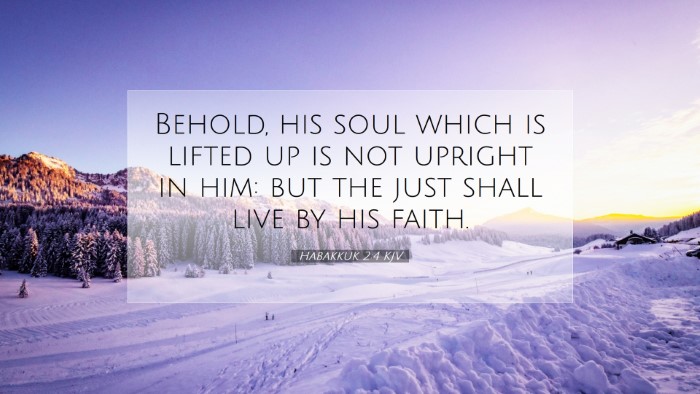Old Testament
Genesis Exodus Leviticus Numbers Deuteronomy Joshua Judges Ruth 1 Samuel 2 Samuel 1 Kings 2 Kings 1 Chronicles 2 Chronicles Ezra Nehemiah Esther Job Psalms Proverbs Ecclesiastes Song of Solomon Isaiah Jeremiah Lamentations Ezekiel Daniel Hosea Joel Amos Obadiah Jonah Micah Nahum Habakkuk Zephaniah Haggai Zechariah MalachiHabakkuk 2:4
Habakkuk 2:4 KJV
Behold, his soul which is lifted up is not upright in him: but the just shall live by his faith.
Habakkuk 2:4 Bible Commentary
Commentary on Habakkuk 2:4
Habakkuk 2:4 is a pivotal verse that encapsulates the profound theological theme of faith, standing as a cornerstone for both the Old and New Testaments. Its interpretation has been the subject of extensive commentary throughout church history, and the insights of esteemed theologians such as Matthew Henry, Albert Barnes, and Adam Clarke shed considerable light on its significance.
Text of Habakkuk 2:4
"Behold, his soul which is lifted up is not upright in him: but the just shall live by his faith."
Overview of the Verse
This verse presents a stark contrast between two types of individuals: the arrogant or proud man, whose soul is 'lifted up' and thus not upright, and the 'just' person who lives by faith. The structure of the verse creates a dichotomy that invites careful scrutiny and reflection.
Exegesis and Key Themes
To gain a comprehensive understanding, it is essential to explore the themes and implications of this verse through the lenses of various commentaries.
Matthew Henry's Insights
Contrast of Characters: Matthew Henry emphasizes the contrast between the proud and the just. He asserts that the proud are often confident in their own strength and wisdom, leading to their downfall. In contrast, the just live by faith, drawing strength from their trust in God rather than in their own abilities.
Faith as a Sustaining Power: Henry underscores that genuine faith sustains individuals through trials. He articulates that the just shall live continuously by faith, indicating a lifestyle rooted in trust and reliance on God’s promises. This faith is not a one-time act but an ongoing journey of trust.
Albert Barnes' Commentary
Faith Defined: Albert Barnes provides a robust definition of faith, indicating it as a firm belief in God's character, promises, and providence. He argues that true faith is not merely intellectual assent but includes reliance upon God in all circumstances.
The Nature of Pride: Barnes elaborates on the nature of the proud man's soul being 'lifted up,' suggesting that this pride leads to instability and moral corruption. This serves as a reminder that self-reliance is ultimately unfulfilling and detrimental, contrasting sharply with the stability found in faith.
Adam Clarke's Contributions
Covenant Context: Adam Clarke positions this verse within the broader context of God's covenant with His people. He notes that Habakkuk is addressing the prophet’s concerns regarding justice and the apparent success of the wicked. Clarke asserts that while the proud may prosper temporarily, it is the faithful that will endure and be justified before God.
The Just and Their Reward: Clarke emphasizes the eschatological implications of this verse, defining 'the just' as those justified by their faith in Christ. He points out that this living by faith encompasses both the present experience of believers and their ultimate redemption.
Theological Implications
The theological implications of Habakkuk 2:4 extend far beyond its immediate context. This verse has been a foundational reference in the New Testament, particularly in Romans 1:17, Galatians 3:11, and Hebrews 10:38. It serves as a bridge between the Old and New Covenants regarding the nature of faith and righteousness.
Faith in the New Testament
This verse's resounding affirmation that "the just shall live by his faith" was profoundly utilized by Paul and the author of Hebrews to depict the essence of faith in the life of a believer in Christ. In the context of the New Testament, justifying faith is seen as an active trust in Christ's atoning sacrifice.
Practical Applications
For pastors, students, theologians, and Bible scholars, the implications of Habakkuk 2:4 are significant.
- Encouragement in Trials: Believers are reminded that faith sustains them in adversity, urging them to trust in God's promises despite visible circumstances.
- Clear Distinction Between Faith and Pride: This verse encourages introspection concerning personal reliance versus reliance on God, prompting a humble approach to faith.
- Foundation of Righteousness: The verse serves as a foundation for understanding how righteousness is attributed in the redemptive plan of God, fostering deeper theological reflection on the nature of salvation.
Closing Thoughts
In conclusion, Habakkuk 2:4 stands as a profound declaration of the life of faith juxtaposed against the perils of pride. The insights drawn from commentaries by Matthew Henry, Albert Barnes, and Adam Clarke not only enrich our understanding of the text but also encourage practical application in faith and ministry. As the church continues to face challenges, this verse remains a beacon of hope, reminding believers that their trust in God is the source of true life and stability.


